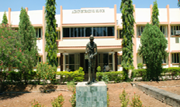Sustainable, Progressive and Holistic Education for Rural Empowerment (SPHERE)
The Gandhigram Rural Institute, started in 1956 to bring higher education to the villages, is fulfilling its mandate through provision of quality education to rural populace by undertaking society-based action research projects and rural oriented extension programmes standing shoulder to shoulder with governmental and non-governmental agencies.
The Institute became a Deemed to be University in 1976 in recognition of its excellent contribution to rural India through its holistic, rural-oriented three-pronged strategy of education. National leaders have acknowledged the Institute’s role in nation building through rural empowerment.
While the Institute embarked on extension activities since its inception, UGC included extension as the third component only in 1976. The various departments and programmes have been structured largely on the rural reconstruction programmes of Mahatma Gandhi. Departments andCentres like Rural Development, Rural Industries and Management, Rural Health and Sanitation, Cooperation, Political Science and Development Administration, Extension Education, Rural Technology and Rural Energy are unique in demonstrating the Institute’s commitment for rural transformation.
Twenty nine out of the sixty twoacademic programmes including Diploma and Certificate programmes are rural-oriented and unique and many of them, being first of their kind, aim at rural empowerment. The Institute works to empower the rural masses through courses on sustainable farming practices, better rural health and sanitation, decentralised governance, rural housing, appropriate rural technology, and renewable energy sources among others. Its DDU-Kaushal Kendra offers skill training for rural empowerment through its eight B.Voc. and two D.Voc. programmes.
During the assessment period, 5770 students graduated from the Institute. More than 85 per cent of these graduates are from rural areas; nearly 55 per cent of them are first generation graduates and 58% students are women. In fact, 25,477 graduates have emerged out of the portals of this institution since it became a Deemed to be University and the alumni of GRI occupy pivotal positions both in India and abroad. The alumni have contributed to the national development by serving as Central Minister, MPs and MLAs, IAS / IPS / IFS officers, Planning Commission Members, District Collectors, Heads of Institutions and Laboratories, Scientists, Teachers, State and District Level Officers, Prolific Writers, Film Directors, and Heads of NGOs / CBOs.
The research projects undertaken by the faculty and their scholars highlight rural social issues and offer viable solutions. During the assessment period, 147 research scholars received their PhDs for research on rural issues and faculty members carried out 51research projects focusing on rural issues with a financial outlay of Rs. 13.91 crores. As many as 217 research articles, 42 books and 173 book chapters contributed by the faculty and research scholars focus on rural empowerment.
The Institute plays a major role in policy making of the Govt. of India. It was a nodal agency for the training of World Bank officials under Village Immersion Programme (VIP) and training of elected Panchayat level leaders and water and sanitation personnel. The Institute worked in tandem with Central and State Governments in the implementation of projects like Hunger Free project, Comprehensive Watershed Programme, Drought Prone Area programme, Women empowerment programmes, and Integrated Child Development Programme. Currently, faculty members of the Institute serve in the Task Force for drafting the New National Cooperation Policy; National Executive Committeeof Unnat Bharat Abhiyan; and on the expert committee on Supplementation of Weaning Foods of ICDS, Tamil Nadu.
The Institute’s key role in the domain of rural development has earned it the status of a Nodal Agency for the implementation of Unnat Bharat Abhiyan of the Govt. of India. Under Unnat Bharat Abhiyan, the Institute supervises 159 institutions across South Tamil Nadu by organising programmes impacting rural lives.
The Institute has been recognised as a National Level Monitor for monitoring the implementation of government sponsored rural development programmes of the Ministries of Rural Development, Panchayati Raj, Drinking Water and Sanitation across various states.
The Institute has a Krishi Vigyan Kendra which advises farmers with regard to new farming practices. Since its inception, it has reached out to nearly 85000 farmers with 3451 field demonstrations, 53 Kisan Melas, 5423 training programmes and 137 animal health camps. It has won prestigious awards for cluster level frontline demonstration on oil seeds, training programmes, and for documentingthe success stories of farmers.
The Centre for the Study of Social Exclusion and Inclusive Policy takes up issues pertaining to the disadvantaged sections of the society and takes effort to mainstream them. Significant contributions include the creation of district-level database of transgenders and a report on health status of manual scavengers and cremation workers.
To facilitate lifelong learning, the Institute offers avenues for school drop-outs to complete their school education through the National Institute of Open Schooling (NIOS) of which GRI is a nodal centre. During the assessment period, 378 rural students benefitted from NIOS.
The Institute, through its 32 adopted villages and 14 Balwadis, has worked closely with the villagers in the implementation of National Literacy Mission and has been honoured with the NLM-UNESCO award for adult literacy. The Institute, through its collaboration with national and international organisations like Ford Foundation, Rajiv Gandhi Foundation, Petroleum Conservation Research Association, National Council for Rural Institutes, and Live with Friends on Earth, Tokyo, has conducted collaborative research, training and outreach activities empowering villagers in the districts of Madurai, Theni and Dindigul. The Institute has been adjudged the Best Suryamitra Skill Development Institute award for training 217 village youth and the NIWE-IREDA Best Institute of Higher Learning in Wind Energy with a cash award of 1.0 lakh. It has been empanelled for the implementation of GIZ funded iRISE Upskilling Training Programme.
Thus GRI, started with the objective of rural empowerment, has been continuously working towards realising its mandate by offering unique academic programmes, undertaking rural-oriented research projects and programmes, and carrying out rural extension activities. The Gandhigram Rural Institute serves the nation by focussing on science and technology enabled Integrated Rural Development, thus validating its vital role in building Viksit Bharat.

